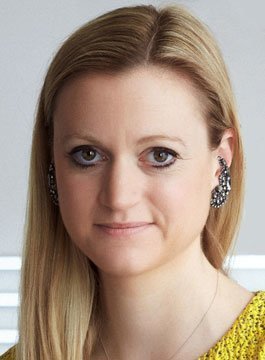Sophie Hackford is a futurist and keynote speaker.
Sophie researches novel technologies and their impact on our lives. From Quantum computing to robots in orbit, she takes audiences on a rollercoaster ride through the explosive innovations underpinning our Future.
She has given over 200 provocative talks to boards and exec teams on novel science and tech. Clients come from every industry – Adobe, Bank of New York, DeepMind, EY, Vogue – although the best questions have so far come from audiences of schoolchildren.
Sophie is an advisor to John Deere & Co on the Future of food, climate, and agriculture. She is also an advisor to New Lab in Brooklyn.
Hackford co-founded 1715Labs: a spinout from Oxford University’s Astrophysics Department, labelling data to train algorithms.
She is on the board of two growth-stage startups: Not Just a Label and Classlist.
Sophie previously worked at WIRED Magazine, Singularity University on the NASA Research Park in Silicon Valley, and Oxford University, where she raised $120m for frontier-bending research.
Despite genuine threats, Sophie is an optimist about the Future.
Sophie Hackford Futurist Speaker
Sophie is a leading futurist keynote speaker. She speaks on topics including the Metaverse and the Virtual Internet, Data and Artificial Intelligence, Robotics, Digital Twins and the Physical Internet, Private Space Industry, Quantum Computing, Risk and Resilience and How to think about the Future.
She explores questions such as:
- Are we turning the world into a computer?
- If data is the language of machines, shouldn’t we learn to speak it?
- Are computers no longer a product but a place?
- How will space technologies change life on Earth?
- Can avatars give us immortality?
- How do demographic forces stimulate robotics?
- AI and art – do we see AI not as it is but as we are?
Speaking topics include:
Data: As we increasingly live, work and play inside giant robots (factories, warehouses, offices, airports, and Alexa-enabled homes), we need to learn to speak ‘data’: the language of the machines.
Sophie will explore how the world is turning into a computer processing information about us all the time. Our data identity (like our face or fingerprint) is login to both physical and digital spaces.
Privacy, personal sovereignty, security, ethics, and technical limitations, are balanced with the opportunities this depth of data provides.
AI: Sophie will demystify artificial intelligence, an emerging set of technologies promising to transform our lives and even give us (digital) immortality.
As the bot economy proliferates, Sophie will explore how personal avatars might empower consumers to autonomously find deals, jobs, diagnoses, or even love. Beyond autonomous avatars, Sophie will also discuss autonomous companies, entirely digital entities selling services or products to other autonomous companies and us.
If AI is a system, many pieces are still missing, so Sophie will weave in this overheated technology space’s social, economic and existential possibilities.
Virtual Technologies: Sophie will discuss the increasing blend of real and virtual, using examples from computer games like Pokemon Go. She will take us from fake news to fake worlds. As we digitise more virtual objects and virtual experiences, Sophie will demonstrate we have only taken our first steps on the 3D internet.
Private Space Industry: What can we learn for Earth from those innovating in space? In the past decade, a new industry – and economy – has emerged on off-Earth. Sophie will describe how manufacturing and mining in space, medical research in space, travel to/from space, satellites in space, data centres in space, even terraforming far-off planets will change our lives here on Earth.
Quantum Computing: Without a new computing architecture, our AI dreams might remain firmly in the Future. As ‘quantum supremacy’ nears, quantum machines offer enhanced power and the ability to ask devices new questions we couldn’t ask before.
Quantum technologies represent a new industry, where overnight, current systems could break (like encryption and communication). New opportunities will emerge only if you are ‘quantum ready’.
Man and Machine: Where do we end and the robots begin? How comfortable are we with synthetic friends? How – and where? – to tax the robots? Sophie will explore the uneasy ambivalence we feel about these machines as we flip haphazardly between compassion and fear. She illustrates these big questions with wonderfully creative projects by artists and hackers designed to provoke our thinking.
Physical Internet: Autonomous vehicles, delivery drones, Hyperloop, ‘gigafactories’ – when all plugged together, these can be thought of as a ‘physical internet’, a platform that sends humans, goods, and vehicles around the world seamlessly, similar to the way the internet transmits data. Sophie will explore a seamless transport future where rockets and robots collaborate.
Demography and Robotics: Sophie will explore how technology and demography are converging, precipitating enormous spending on robotics by economies like China, Japan, and Korea. Robots might also be needed to fill jobs left unfilled by plummeting birth rates, not just for elder care and neuro-enhancement needs.
Internet of Living Things: Sophie will explore how we might soon use genetic information to make essential business decisions far beyond healthcare, from security to supply chain management to food safety. She’ll show how we are on the brink of a genomics explosion, changing how we make decisions, and personalising our healthcare and lifestyle behaviours.

